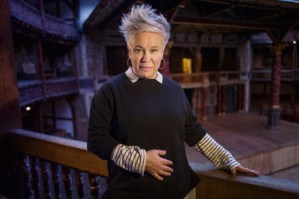Why Skepta and streetwear can help young people connect with Shakespeare
Matt Trueman on why we need invention to bring young people to the Bard

(© Tristram Kenton)
How do we get the young to like Shakespeare? That old chestnut. So often, Shakespeare sits on school desks; his words pored over and squeaked onto whiteboards. He is Arden introductions and school trips to Stratford. He’s the dum-de-dum-de-dum of iambic pentameter, choice phrases and themes. He's homework.
Of course, Shakespeare doesn’t live in the classroom, but onstage. Even there, however, done badly, his plays can seem tedious. Words, words, words: well-spoken but stiff. That’s the stuff of English exams, not theatre or art. A bad experience can put a kid off for life – and, god knows, we’ve all sat through our fair share of them.
Following the death of director Michael Bogdanov, the Telegraph‘s critic Dominic Cavendish went back to his youth. He recalled Bogdanov’s legendary cycle of Henry plays (IV and V) at the Old Vic in 1987. He was, he says, still a schoolboy, but here was Shakespeare come to raucous life. "Words freighted with scholastic anxiety became the stuff of lucid, boisterous intercourse." He remembers the beer-swilling swagger of Michael Pennington‘s Prince Hal and John Woodvine’s Falstaff quaffing raw eggs for recovery; Pistol as a punk in a studded ‘Hal’s Angel’ jacket.
I can’t help but think Dominic Cavendish has forgotten his younger self
It’s a lovely little elegy for a show that stuck: one of those moments when theatre leaves a lasting impression. Michael Billington has written about Peter Hall’s Wars of the Roses, from 20 years earlier, in much the same way – with a sense of surprise and delight and excitement. Go back further still and you find a young Kenneth Tynan – still a student – raving about Olivier’s Richard III, who "eats into the memory like acid into metal." The thing he can’t shake is the pace – the "baffling speed" of it all.
I daresay that each of those productions would seem hopelessly tired now – the sort of stuffy, scholarly Shakespeare you endure more than enjoy – but at that moment, seen through young eyes, all felt fresh, new and alive. The sense, always, is of discovery: 'I had no idea Shakespeare could be like that.'
Cavendish’s recent article drives at a question: Do we get the Shakespeare we deserve? He laments what he sees as a dearth of full-throttle Shakespeare, teeming with life – nothing to match Bogdanov’s best – and calls for (of all things) an increased RSC presence in London. As if the spirit of Stratford-upon-Avon might save the day. Along the way, he dismisses the fashion for director-led intervention: the gender-switching of Simon Godwin‘s Twelfth Night and Robert Icke’s "decent but bloodless" Hamlet, starring Andrew Scott.
Emma Rice's work is radical in situ, in relation to the particularities of the Globe
I can’t help but think he’s forgotten his younger self. Because it’s precisely those shows that pull new audiences to Shakespeare – those productions that let him leave the classroom behind and truly become our contemporary. Just as Cavendish saw The Young Ones echoed in Bogdanov’s Henrys, so the young audiences that saw Icke’s Hamlet at the Almeida (and, a great many did, for free) will have seen shades of the best Netflix box-sets. You only have to read the student blogger Florence Bell to see the impact it’s had. Or else, try Harry MacDonald on Roman Tragedies. Both have the energy of those earlier reviews.
If Shakespeare’s to feel thrillingly new, it takes as much irreverence as it does invention. He needs, most of all, to surprise.
It’s one of the reasons I’m so disappointed by Emma Rice’s departure from the Globe – still. To say, as some have done, that her work isn't radical, that the same spirit and style can be found elsewhere, is to miss the point. It is radical in situ, in relation to the particularities of the Globe. I’ve some sympathy with Dominic Dromgoole’s defence of shared light – "taking away that uniqueness doesn’t strike me as radical, it strikes me as conformist" – but I’ve antipathy too.
Shakespeare’s Globe pulls in young audiences. School trips trudge along for the history lesson. They’re dragged to see Shakespeare as his own audiences would have done. Its £5 tickets – and, pray God, they’re preserved – put it into the realm of pocket money, allowing curious kids to take a look. Radical is catching them off guard, hooking them in with something they don’t expect, something irreverent and spectacular and lively. It’s not that you can’t do that in shared light, rather that Skepta and streetwear might have more luck – especially against lime walls and thatch. That’s when this 453 year-old really gets down with the kids.













